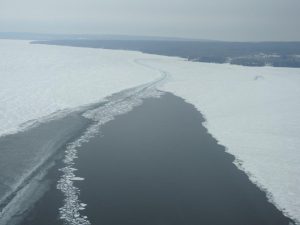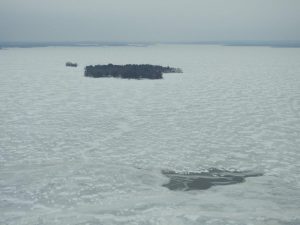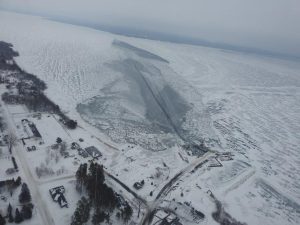2022-Mar-05
Ice Conditions on the Bay are Visibly Starting to Change
With freezing rain, rain, and warm temperatures in the forecast this weekend, the OPP and Canadian Coast Guard want you to be aware that the ice conditions on Georgian Bay are already visibly starting to change.
These aerial photographs taken on March 1, 2022 show openings in the ice on the south end of the Bay near Midland, Penetanguishene, Tiny Township, Christian Island and the surrounding areas:

The ferry route from Christian Island

Ice near buoy M12 east of Pinery Point, Tiny Township

Buoy M12 looking west at Pinery Point

Near Buoy M12 south of Beausoleil Island

East view from Christian Island towards Cedar Point
Please remember that during this time of the year ice conditions can change quickly. If you travel out onto an ice surface, always check current and past weather conditions and check with local residents who may have knowledge of the ice conditions. No ice is safe ice, so if you don’t know, don’t go. The Red Cross has important information on ice safety here.
Remember the 1-10-1 Principle
1-10-1 is a simple way to remember the first three phases of cold water immersion and the approximate time each phase takes.
1 Minute – Cold Shock
An initial deep and sudden gasp followed by hyperventilation. Cold Shock will pass in about 1 minute. During that time concentrate on avoiding panic and getting control of your breathing.
10 Minutes – Cold Incapacitation
Over approximately the next 10 minutes you will lose the effective use of your fingers, arms and legs for any meaningful movement. Concentrate on self rescue initially, and if that isn’t possible, prepare to have a way to keep your airway clear to wait for rescue. Swim failure will occur within these critical minutes and if you are in the water without a lifejacket, drowning will likely occur.
1 Hour – HYPOTHERMIA
Even in ice water it could take approximately 1 hour before becoming unconscious due to Hypothermia. If you understand the aspects of hypothermia, techniques of how to delay it, self rescue and calling for help, your chances of survival and rescue will be dramatically increased.
